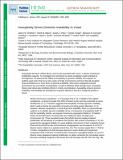| dc.contributor.author | Sheltzer, Jason Meyer | |
| dc.contributor.author | Blank, Heidi Marie | |
| dc.contributor.author | Pfau, Sarah Jeanne | |
| dc.contributor.author | Tange, Yoshie | |
| dc.contributor.author | George, Benson M. | |
| dc.contributor.author | Humpton, Timothy J. | |
| dc.contributor.author | Brito, Ilana Lauren | |
| dc.contributor.author | Hiraoka, Yasushi | |
| dc.contributor.author | Niwa, Osami | |
| dc.contributor.author | Amon, Angelika B | |
| dc.date.accessioned | 2013-12-10T21:45:03Z | |
| dc.date.available | 2013-12-10T21:45:03Z | |
| dc.date.issued | 2011-08 | |
| dc.date.submitted | 2011-03 | |
| dc.identifier.issn | 0036-8075 | |
| dc.identifier.issn | 1095-9203 | |
| dc.identifier.uri | http://hdl.handle.net/1721.1/82910 | |
| dc.description.abstract | Aneuploidy decreases cellular fitness, yet it is also associated with cancer, a disease of enhanced proliferative capacity. To investigate one mechanism by which aneuploidy could contribute to tumorigenesis, we examined the effects of aneuploidy on genomic stability. We analyzed 13 budding yeast strains that carry extra copies of single chromosomes and found that all aneuploid strains exhibited one or more forms of genomic instability. Most strains displayed increased chromosome loss and mitotic recombination, as well as defective DNA damage repair. Aneuploid fission yeast strains also exhibited defects in mitotic recombination. Aneuploidy-induced genomic instability could facilitate the development of genetic alterations that drive malignant growth in cancer. | en_US |
| dc.language.iso | en_US | |
| dc.publisher | American Association for the Advancement of Science | en_US |
| dc.relation.isversionof | http://dx.doi.org/10.1126/science.1206412 | en_US |
| dc.rights | Creative Commons Attribution-Noncommercial-Share Alike 3.0 | en_US |
| dc.rights.uri | http://creativecommons.org/licenses/by-nc-sa/3.0/ | en_US |
| dc.source | PMC | en_US |
| dc.title | Aneuploidy Drives Genomic Instability in Yeast | en_US |
| dc.type | Article | en_US |
| dc.identifier.citation | Sheltzer, J. M., H. M. Blank, S. J. Pfau, Y. Tange, B. M. George, T. J. Humpton, I. L. Brito, Y. Hiraoka, O. Niwa, and A. Amon. “Aneuploidy Drives Genomic Instability in Yeast.” Science 333, no. 6045 (August 18, 2011): 1026-1030. | en_US |
| dc.contributor.department | Massachusetts Institute of Technology. Department of Biology | en_US |
| dc.contributor.department | Koch Institute for Integrative Cancer Research at MIT | en_US |
| dc.contributor.mitauthor | Sheltzer, Jason Meyer | en_US |
| dc.contributor.mitauthor | Blank, Heidi Marie | en_US |
| dc.contributor.mitauthor | Pfau, Sarah Jeanne | en_US |
| dc.contributor.mitauthor | George, Benson M. | en_US |
| dc.contributor.mitauthor | Humpton, Timothy J. | en_US |
| dc.contributor.mitauthor | Amon, Angelika B. | en_US |
| dc.relation.journal | Science | en_US |
| dc.eprint.version | Author's final manuscript | en_US |
| dc.type.uri | http://purl.org/eprint/type/JournalArticle | en_US |
| eprint.status | http://purl.org/eprint/status/PeerReviewed | en_US |
| dspace.orderedauthors | Sheltzer, J. M.; Blank, H. M.; Pfau, S. J.; Tange, Y.; George, B. M.; Humpton, T. J.; Brito, I. L.; Hiraoka, Y.; Niwa, O.; Amon, A. | en_US |
| dc.identifier.orcid | https://orcid.org/0000-0002-4698-2746 | |
| dc.identifier.orcid | https://orcid.org/0000-0001-9837-0314 | |
| dc.identifier.orcid | https://orcid.org/0000-0003-1381-1323 | |
| mit.license | OPEN_ACCESS_POLICY | en_US |
| mit.metadata.status | Complete | |
